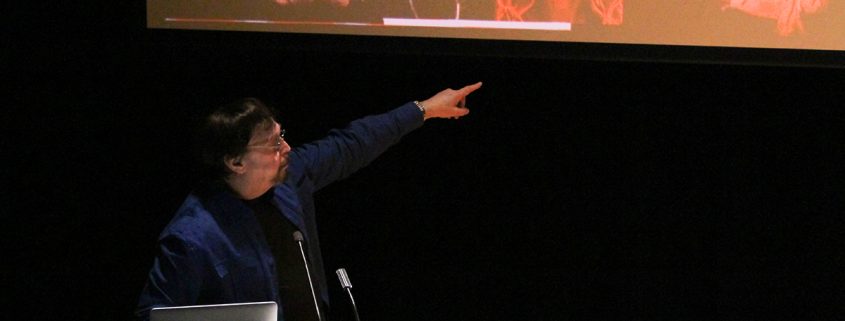USC Professor Richard Wolf speaks on mindfulness in music
Although college is a time meant for positive growth and exploration, it often turns into a blur of all-nighters, deadlines and anxiety about what the future holds — and as a result, it becomes easy for students to forget to be mindful of the present. USC Thornton School of Music professor Richard Wolf recognizes the inevitability of stress and urges the importance of practicing mindfulness through meditation, especially in service of music.
Wolf delivered a lecture titled “Good Vibrations: A Musician’s Guide to Mindfulness and Meditation” on the evening of March 28 at the USC Brain and Creativity Institute, in which he discussed the mutually constitutive relationship between playing music and practicing meditation.
Wolf is a music industry professor, Emmy Award-winning composer, recipient of multiple Platinum awards from the Recording Industry Association of America and founder and CEO of The Producers Lab, Inc., an independent multimedia production company.
Since breaking into the realm of television music, Wolf has composed custom theme music for Fox Sports Net and shows such as The CW’s America’s Next Top Model and CBS’ The Big Bang Theory.
After a career in the recording business as a producer and songwriter, Wolf made a drastic career change to work in television, which catapulted him into a
high-pressure lifestyle. Eventually, his stress culminated in a
panic attack that landed him in the emergency room, after which his doctor prescribed 20 minutes of daily meditation.
Through meditation alone and without the aid of medicine, Wolf was able to regulate his cortisol levels and achieve a newfound serenity in both his personal and professional lives.
Consequently, Wolf realized the bridge between mindfulness and music production and the substantial benefits of meditation.
“I realized when I saw one connection between music and mindful meditation that there were all these other connections,” Wolf said. “Both are nonverbal; both are transpersonal and not about a self-referential agenda. Both harmonize the mind, body and feelings in one process.”
As a lifelong musician, Wolf believes that the silence provided by meditation is a necessary counterpart to the sound of music and that the two opposites interact to engender harmony.
“Music is not just sound; music is also silence,” Wolf said. “Music is a balance between peace and disturbance. We always focus on the busyness and noise but neglect the silence, which is necessary for balance. In mindfulness, you really enjoy the pleasures of peace.”
As a musician, Wolf admitted that many artists feel a present connection during performance.
“So it turns out that musicians have these skills and experiences that they can apply to this other process [of meditation] which, in turn, will strengthen our other abilities,” Wolf said.
However, Wolf cautioned against viewing meditation as a panacea or miracle drug — the point of practicing mindfulness being not to make one a better musician, but to make one’s life as a musician better.
Wolf advocated for meditation as a means of quieting one’s internal critic and reconciling concepts of the ideal and the real, citing an array of celebrated artists who have sworn by meditation to induce creativity, from singer-songwriter Paul McCartney to rapper Kendrick Lamar to film director David Lynch, who famously said, “Negativity is the enemy of creativity.”
To close his lecture, Wolf led the audience — comprised primarily of Thornton students and his colleagues — through several breathing and meditation exercises, urging them to reap the benefits of mindfulness in fostering musical refinement and overall peace.
“Why do you have to wait until you’re dead to rest in peace?” Wolf said. “You can rest in peace now and you’ll be more alive than you’ve ever been,”


